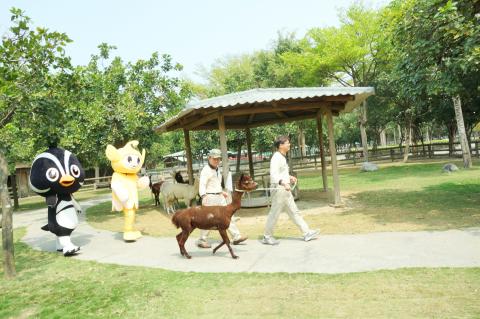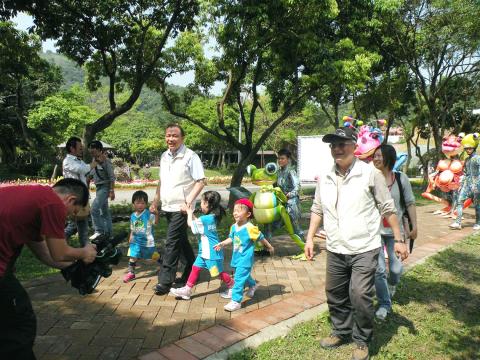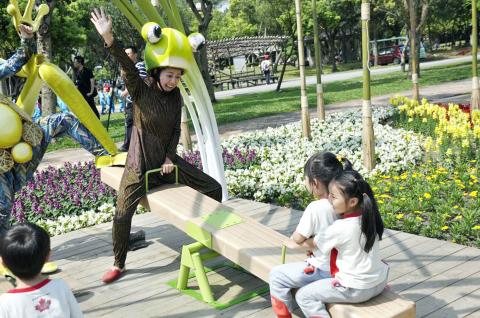The Yilan Green Expo has been taking place for over a decade and has become one of the most recognized environmental awareness activities in the country. This year, the event is back at the Wulaokeng Scenic Area (武荖坑風景區) where it will play host to a huge range of family activities for a total of 51 days. The expo, which opens tomorrow, combines tourism, food, entertainment and education in a single massive event that has greatly raised awareness of Yilan’s efforts to establish itself as a new Eden, an escape back to nature for residents of Taiwan’s overdeveloped west coast.
The 2013 Green Expo has adopted the theme of Return to the Forest, and promises visitors to Wulaokeng Scenic Area not just the beautiful scenery and warm welcome for which Yilan is already famous, but also a chance to reflect on issues such as bringing back a balance between the drive for production and the need to establish a quality of life. Finding a sustainable solution to preserving our modern lifestyles and conserving Taiwan’s increasingly threatened natural habitat tops the agenda, though you probably wouldn’t guess it from the host of fun activities, lucky draws, performances and DIY workshops to be found there.
Yilan County commissioner Lin Tsung-hsien (林聰賢) said that “natural agriculture, tourism, LOHAS lifestyle and healthy living, and experience and learning about nature” would be the keystones of this year’s event. Natural agriculture is an issue of growing importance given that Taiwan, according to a recent report based on the World Economic Forum’s Environmental Sustainability Index published by the Kuanshu Educational Foundation (觀樹教育基金會), is reported as being the heaviest user of chemical fertilizers and pesticides in the world. LOHAS is an acronym for Lifestyles of Health and Sustainability, a buzzword that has caught on in Taiwan through its linking of environmental issues with personal health. While it will take much more than Yilan’s Green Expo to change Taiwan’s agricultural habits, which for the large part continue to favor the use of chemicals to boost yields, Lin said that this year’s event, with the creation of an “organic lifestyle area,” would be an important milestone in pushing forward the policy of the “organic new Yilan.”

Photo Courtesy of the Lanyang Agricultural Development Foundation

Photo Courtesy of the Lanyang Agricultural Development Foundation

Photo Courtesy of the Lanyang Agricultural Development Foundation

That US assistance was a model for Taiwan’s spectacular development success was early recognized by policymakers and analysts. In a report to the US Congress for the fiscal year 1962, former President John F. Kennedy noted Taiwan’s “rapid economic growth,” was “producing a substantial net gain in living.” Kennedy had a stake in Taiwan’s achievements and the US’ official development assistance (ODA) in general: In September 1961, his entreaty to make the 1960s a “decade of development,” and an accompanying proposal for dedicated legislation to this end, had been formalized by congressional passage of the Foreign Assistance Act. Two

March 31 to April 6 On May 13, 1950, National Taiwan University Hospital otolaryngologist Su You-peng (蘇友鵬) was summoned to the director’s office. He thought someone had complained about him practicing the violin at night, but when he entered the room, he knew something was terribly wrong. He saw several burly men who appeared to be government secret agents, and three other resident doctors: internist Hsu Chiang (許強), dermatologist Hu Pao-chen (胡寶珍) and ophthalmologist Hu Hsin-lin (胡鑫麟). They were handcuffed, herded onto two jeeps and taken to the Secrecy Bureau (保密局) for questioning. Su was still in his doctor’s robes at

Last week the Democratic Progressive Party (DPP) said that the budget cuts voted for by the China-aligned parties in the legislature, are intended to force the DPP to hike electricity rates. The public would then blame it for the rate hike. It’s fairly clear that the first part of that is correct. Slashing the budget of state-run Taiwan Power Co (Taipower, 台電) is a move intended to cause discontent with the DPP when electricity rates go up. Taipower’s debt, NT$422.9 billion (US$12.78 billion), is one of the numerous permanent crises created by the nation’s construction-industrial state and the developmentalist mentality it

Experts say that the devastating earthquake in Myanmar on Friday was likely the strongest to hit the country in decades, with disaster modeling suggesting thousands could be dead. Automatic assessments from the US Geological Survey (USGS) said the shallow 7.7-magnitude quake northwest of the central Myanmar city of Sagaing triggered a red alert for shaking-related fatalities and economic losses. “High casualties and extensive damage are probable and the disaster is likely widespread,” it said, locating the epicentre near the central Myanmar city of Mandalay, home to more than a million people. Myanmar’s ruling junta said on Saturday morning that the number killed had